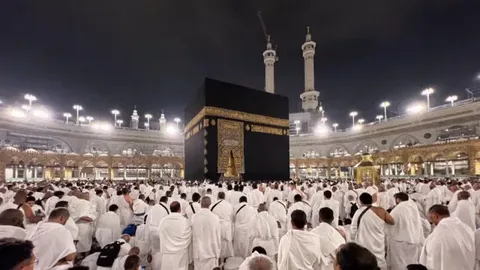Saudi Arabia has officially announced a strict new set of medical rules for Hajj 2026, bringing major changes for anyone planning to perform the pilgrimage next year. The decision, revealed by the Saudi Ministry of Religious Affairs and the Ministry of Health, aims to protect pilgrims and ensure that only those who can physically handle the demanding rituals are allowed to travel.
These new guidelines have created widespread discussion among travelers, tour operators, and global Muslim communities. If you or someone you know is planning Hajj in 2026, understanding these rules is extremely important.
Saudi Arabia Tightens Health Requirements for Hajj 2026
Saudi authorities confirmed that pilgrims who arrive in the Kingdom without meeting the mandatory health standards will be sent back to their home countries. Importantly, the cost of repatriation will be paid by the pilgrim, not the airline or the government.
Doctors to Face Action for Issuing False Certificates
The ministry also issued a strong warning to healthcare providers. Any doctor who issues a fitness certificate to someone who does not meet the eligibility criteria will face legal consequences. This step has been taken to eliminate fraudulent medical clearances and ensure genuine health assessments.
Categories of Pilgrims No Longer Eligible for Hajj
The new rules clearly define which medical conditions will disqualify a person from performing Hajj in 2026. These guidelines were released by the Saudi Ministry of Health to ensure the safety of pilgrims during the physically challenging pilgrimage.
Kidney and Heart Patients
People suffering from kidney diseases—especially those who require dialysis—have been declared ineligible.
Similarly, heart patients who cannot handle physical exertion have been barred from participating.
Chronic and Life-Threatening Diseases
Saudi Arabia has restricted entry for applicants with:
-
Chronic liver disease
-
Chronic lung disease
-
Severe neurological disorders
-
Psychiatric illnesses
-
Dementia or weak memory
-
Major physical disabilities
Elderly Individuals With Age-Related Diseases
Elderly pilgrims suffering from conditions such as:
-
Parkinson’s disease
-
Alzheimer’s disease
will not be allowed to undertake Hajj due to safety concerns.
Pregnant Women and Critical Viral Conditions
Pregnant women will not be permitted to travel for Hajj 2026.
Additionally, anyone diagnosed with:
-
Whooping cough
-
Tuberculosis
-
Viral haemorrhagic fevers
-
Cancer
will be considered medically unfit for the pilgrimage.
These conditions, according to Saudi officials, pose serious health risks during the intense and crowded rituals of Hajj.
Mandatory Medical Screening for Pilgrims
The Ministry of Religious Affairs confirmed that medical teams will screen pilgrims before departure. This will be done at designated centers in their home countries.
Upon arrival in Saudi Arabia, Saudi inspectors will recheck fitness certificates to confirm authenticity and eligibility. Only those who pass both checks will be allowed to proceed to the holy sites.
Why These Rules Matter
Hajj is physically demanding. Pilgrims walk long distances, face extreme heat, and participate in rituals that require endurance. Over the years, thousands of medical emergencies have occurred during Hajj due to pre-existing health conditions.
These new rules aim to reduce such incidents and ensure smoother management during one of the largest annual gatherings in the world.
Impact on Pilgrims Around the World
Muslim communities across Asia, Africa, the Middle East, Europe, and the Americas are discussing these new guidelines. Travel agencies, Hajj operators, and medical professionals are preparing to implement the new standards.
What Pilgrims Should Do Now
If you are planning Hajj 2026:
-
Get a full medical checkup early
-
Discuss your fitness honestly with a certified doctor
-
Review the official list of prohibited conditions
-
Prepare documentation ahead of time
-
Avoid any attempt to obtain false medical certificates
Meeting Saudi Arabia’s requirements will be crucial to avoid last-minute issues at the airport or upon arrival.
The Importance of Health Awareness During Hajj
Hajj requires physical stamina, mental strength, and emotional readiness. Saudi Arabia’s new rules may seem strict, but they highlight the importance of prioritizing health and safety.
Why Health Regulations Keep Changing
With millions of pilgrims arriving each year, the risk of:
-
Infectious diseases
-
Heatstroke
-
Dehydration
-
Medical emergencies
remains high. Authorities continuously update policies to protect the health of pilgrims and ensure safe crowd management.
Reaction From Pilgrims and Community Leaders
Many people welcome the decision, saying it will minimize overcrowding and reduce health risks. Others feel concerned about elderly family members or people with mild chronic conditions.
However, experts agree that strict medical screening is necessary due to the physically demanding nature of Hajj.
Travel Agencies Preparing for New Requirements
Hajj operators are updating their medical criteria, training staff, and coordinating with local doctors to provide accurate fitness certificates. Some agencies are also offering pre-Hajj wellness programs to help pilgrims prepare physically.
Conclusion: A New Era of Safe and Regulated Hajj
The new medical rules for Hajj 2026 mark a major shift in how Saudi Arabia manages the pilgrimage. By restricting high-risk pilgrims and enforcing strict medical screenings, the Kingdom aims to protect lives and ensure a safer Hajj experience for everyone.
If you are planning to perform Hajj next year, staying informed, preparing early, and taking your health seriously will be essential. These guidelines may be strict, but they reflect a much-needed focus on the safety and well-being of all pilgrims.
Read More: Nova Minerals Eyes Major Investment Opportunities in Pakistan’s Mining Sector


